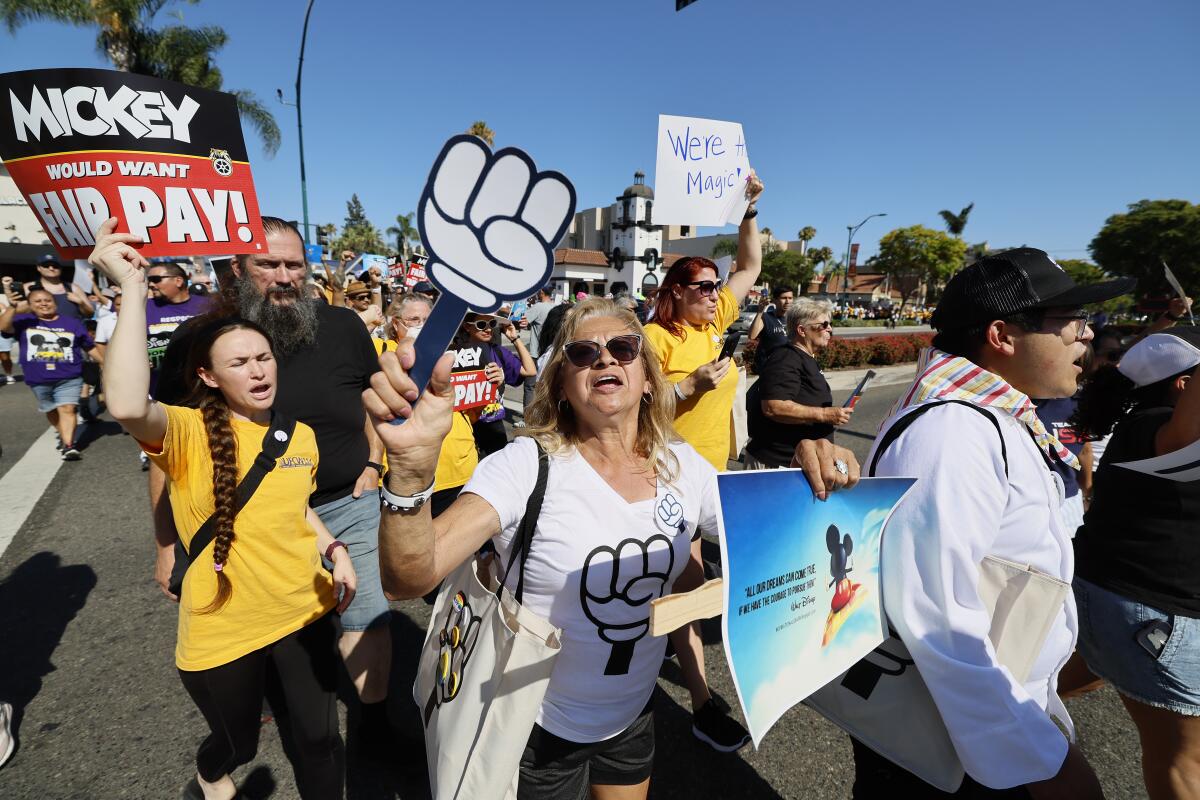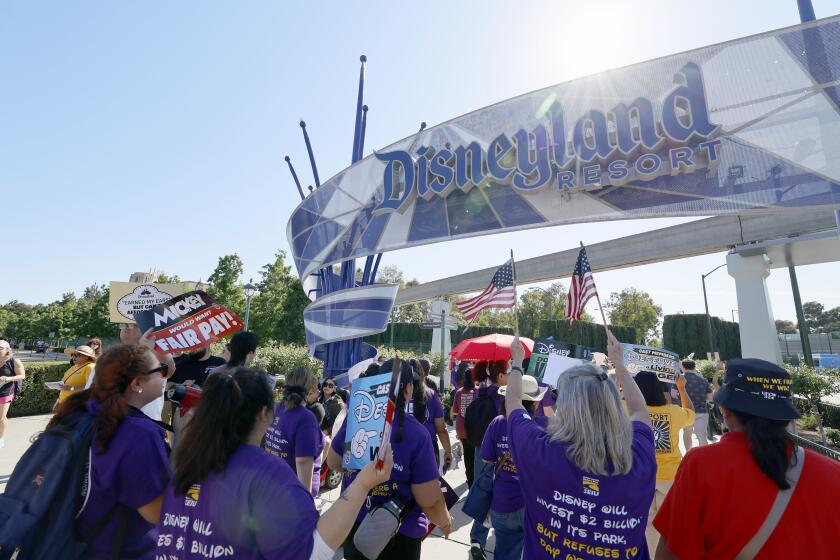Disney agrees to $233-million settlement in wage theft case

- Share via
Five years after workers first took Disneyland to court over skirting an Anaheim minimum wage law, the Walt Disney Co. has agreed to settle a class-action lawsuit for a staggering $233 million.
The company approved the preliminary settlement on Friday, which accounts for back pay with interest as the Anaheim law is set to increase wages in January to nearly $20.50 an hour.
“What we believe is the largest wage and hour class settlement in California history will change lives for Disney families and their communities,” said Randy Renick, an attorney representing the workers in the class-action suit.
The settlement includes more than 50,000 current and former Disney employees.
Back pay owed to workers from Jan. 1, 2019, when the wage law first took effect, until the date Disney adjusted wages at the end of the court fight last year, accounts for roughly $105 million of the total settlement.
Melissa Partida, 58, has worked in room service at Disney’s Grand Californian Hotel in Anaheim since it opened in 2001 and, as a tipped worker, is currently earning $19.90 an hour under the city’s wage law.
Nearing retirement age, she expressed gratitude for the coalition of Disney unions that campaigned for the wage law as a ballot initiative in 2018 and the attorneys who litigated the subsequent court case.
“It’s a big win and we’re happy,” said Partida, a Garden Grove resident. “The cost of living here is very expensive. I don’t know how much back pay I’m going to get, but whatever it is, I didn’t have it before.”
After union members ratified a contract raising pay to $24 an hour, Disney is no longer the minimum-wage employer it used to be.
Orange County Superior Court Judge William Claster is set to review the settlement on Jan. 17. Once approved, a notice will go out to every worker with how much money they will receive.
“The company has been stiffing [thousands of] workers for several years,” said Peter Dreier, a professor of public policy at Occidental College and co-author of “Working for the Mouse: A Survey of Disneyland Resort Employees.”
“They’ve denied them the back pay they’re owed while paying CEO Bob Iger over $31 million a year. It’s only fair that workers get what’s coming to them. And if the world were fair, Iger would take some of it out of his paycheck,” he added.
As part of the tabulation, Disney agreed to substantial penalties, interest and other associated fees on top of the back pay owed.
“We are pleased that this matter is nearing resolution,” said Suzi Brown, a Disneyland spokeswoman. “Currently, all cast members make at least the Measure L requirement of $19.90 per hour, and, in fact, 95% of them make more.”
The company reached an agreement last summer with four unions representing 14,000 workers that raised base pay to $24 an hour.

The dispute between Disney and its workers dates back to February 2018, when the Coalition of Resort Labor Unions released the “Working for the Mouse” survey.
Co-authored by Dreier and Daniel Fleming, the study detailed economic hardships faced by Disney workers at the time, including the finding that almost three-quarters of those surveyed said they didn’t earn enough money to cover basic expenses.
The report’s release arrived in tandem with a “living wage” ballot initiative campaign championed by the union coalition.
Anaheim voters approved Measure L, as the wage law is known, that year.
Starting on Jan. 1, 2019, it ordered a minimum wage of $15 an hour for companies in the Anaheim Resort that enjoyed “tax rebate” agreements with the city.
Disney did not adjust wages in accordance with the law while negotiating pay raises with individual theme park unions and union councils.
A contract between Disney and the university’s nonprofit gave the company exclusive ownership of the economic impact report, which helped make the case for the DisneylandForward expansion.
In response, Disney workers filed a class-action lawsuit in December 2019 that represented 25,000 employees and alleged that the company illegally evaded the wage law.
Disney’s attorneys argued in court that it did not have “tax rebate” agreements with Anaheim and wasn’t subject to the terms of the law.
At the company’s insistence, the Anaheim City Council tore up a 45-year gate tax moratorium and a $267-million bed tax agreement for a planned luxury hotel at Downtown Disney before the election.
Judge Claster initially agreed with Disney in 2021.
But the 4th District Court of Appeal reversed the ruling because a tax rebate agreement was embedded within a 1996 Disney expansion deal passed by Anaheim City Council.
Disney appealed the decision, but the California Supreme Court declined to hear the case, which effectively ended its legal fight against the wage law.
“It’s a win for the workers that stuck it out at the resort and it’s a win for the workers that left because they couldn’t stand it anymore, but are now getting back pay,” Dreier said. “It’s a testament to the resilience and the fortitude of the labor movement and the workers.”
For Mike Levia, a retail worker at Disneyland, the settlement is a moment of relief.
“It’s been a long time coming,” he said. “There are a lot of workers, myself included, that could benefit from this money. It feels like a weight is being lifted off of their shoulders knowing that there’s going to be some extra money to help with the bills.”
All the latest on Orange County from Orange County.
Get our free TimesOC newsletter.
You may occasionally receive promotional content from the Daily Pilot.






